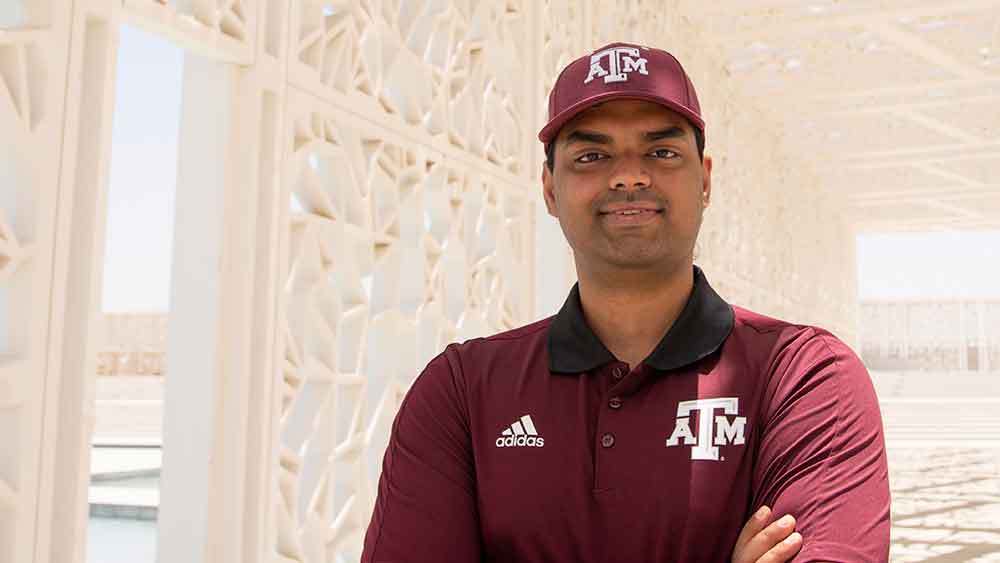
Not many students tackle earning two degrees at the same time from Texas A&M University, but engineering graduate student Kaushik Manikonda is doing just that. Plus, he is exploring the world, gaining research experience and networking with industry professionals.
Manikonda is participating in a visiting researcher program between Texas A&M and Texas A&M University at Qatar. Programs like this allow qualified graduate students to spend multiple semesters or even years abroad in Doha with no changes in their enrollment or immigration status. Apart from applying and getting accepted into the program by a hosting advisor in Qatar, the only official university procedure is getting approval from the Education Abroad Office to conduct research abroad.
Dr. Rashid Hasan, a research professor in the Harold Vance Department of Petroleum Engineering, and Dr. Aziz Rahman, associate professor in the Qatar petroleum program, are co-advising Manikonda on his doctoral degree in interdisciplinary engineering. By completing his doctoral degree in the Department of Multidisciplinary Engineering, Manikonda is able to create his own path by merging his cross-discipline research interests. Rahman and Dr. Ibrahim Hassan, the hosting advisors, oversee the research Manikonda does while on the Qatar campus. For his Master of Science degree, Manikonda works with Dr. Natarajan Gautam, professor and associate department head for graduate affairs in the Wm Michael Barnes '64 Department of Industrial and Systems Engineering.
“I am specializing in data science for industrial and machine learning applications for well control automation for petroleum,” said Manikonda. “Most of my industrial coursework is symbiotic with my petroleum research, and I try to include parts of my research in the graded coursework where possible. I am extremely grateful to my advisors for letting me pursue this.”
Manikonda admits the two degrees create an “immense workload” but says there are incredible advantages to being a visiting researcher. For instance, the Qatar Foundation and Texas A&M at Qatar covered the cost of his travel to Doha, his apartment and will pay the cost of getting him back to College Station when he leaves the program. They even pay for travel to and from major conferences that have accepted papers Manikonda submits on research he does while participating in the program.
“The most appealing benefit is the free housing,” said Manikonda. “But there’s so much more, including help with moving arrangements, getting around Education City and even business travel within Doha.”
Education City is a special area in Doha developed by the Qatar Foundation to host satellite campuses of Texas A&M and seven other foreign universities, plus a local university. The area includes student housing complexes for each university, a student center and several other amenities. All the complexes contain fully furnished apartments, meeting and community spaces, recreation areas, a food court and a massive open-air outdoor social space.
“There’s a mind-numbing selection of foods,” Manikonda said. “Doha is littered with an amazing assortment of Indian, Arabic, Italian and Mediterranean restaurants. I’m having a field day trying new places almost every week.”
Due to its geographical placement, Doha is a “dream city” for the young researcher. Manikonda, originally from India, enjoys the ability to hop on a plane and be with his family a few hours later. He can also reach other nearby travel destinations such as Dubai, Cairo, Istanbul, Moscow, Rome and Athens, with similar, reasonable airline flights.
Though he doesn’t have much time for traveling thanks to studies and long hours in the lab, Manikonda noted that all his hard work in the program has provided positive benefits in other ways.
“This is an opportunity to show future employers I can adapt and thrive in a foreign environment,” said Manikonda. “Also, I have the chance to network with oil and gas professionals in the Middle East region at major conferences over here. The skills I’m learning are invaluable, as they would be for any young professional.”
Visiting researchers do face significant challenges, such as language barriers, cultural differences, currency exchanges, international travel cards, desert climates and even vendor interactions. While he cautioned that female visitors should dress conservatively while traveling in Doha or elsewhere in the region, Manikonda found everyone inside Education City to be “accommodating, professional and respectful” to foreign students.
Manikonda fully promotes the program and recommends other students check with their advisors for the qualifications but recognizes it may not be for everyone.
“Since I frequently travel to the Middle East, India and Europe, I already had most of these challenges sorted and never faced any major issues,” said Manikonda. “But for someone with limited international travel experience, I recommend a good deal of preparation before boarding that flight to Doha.”